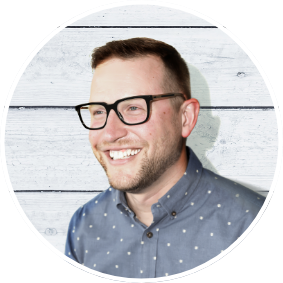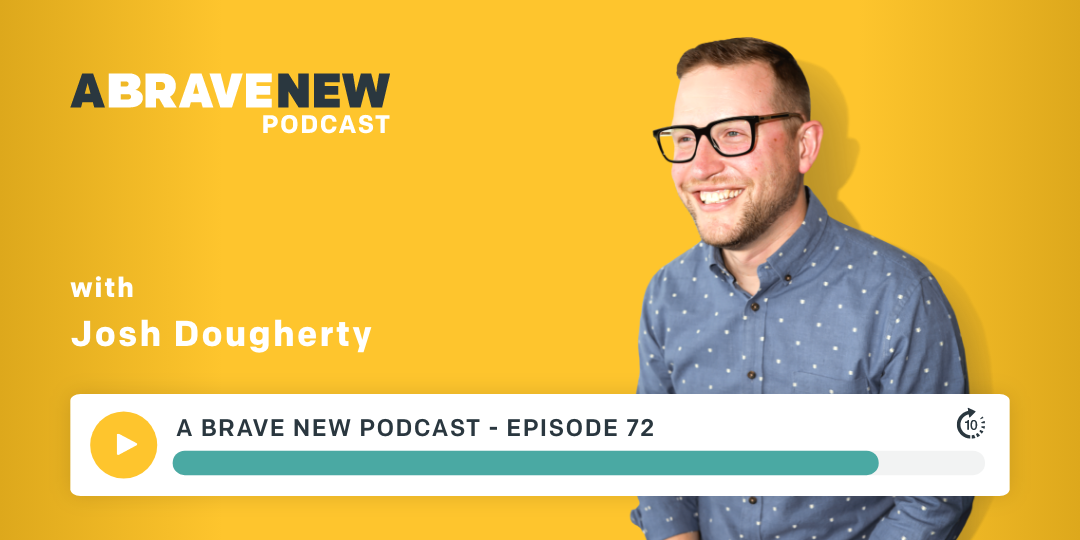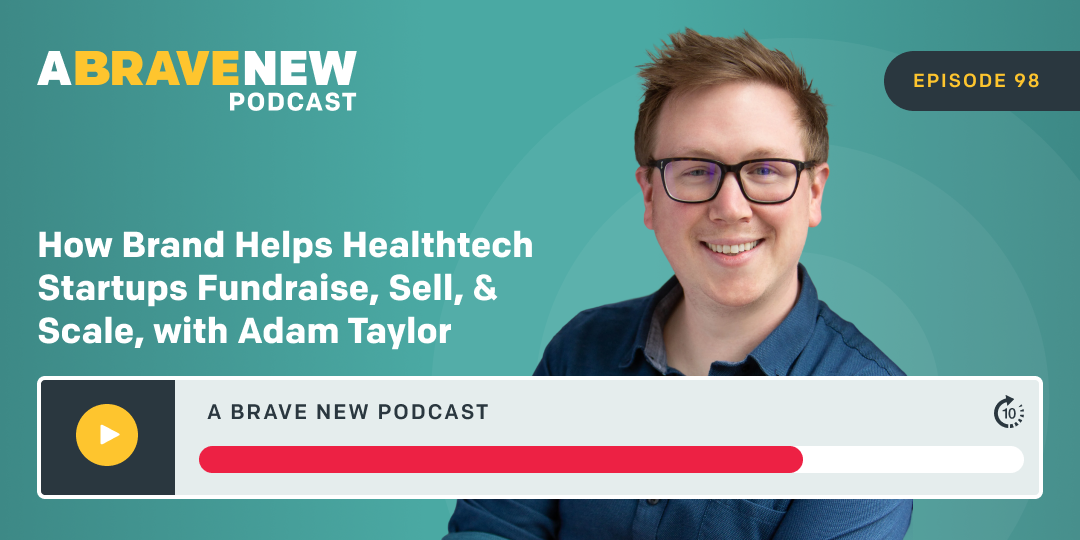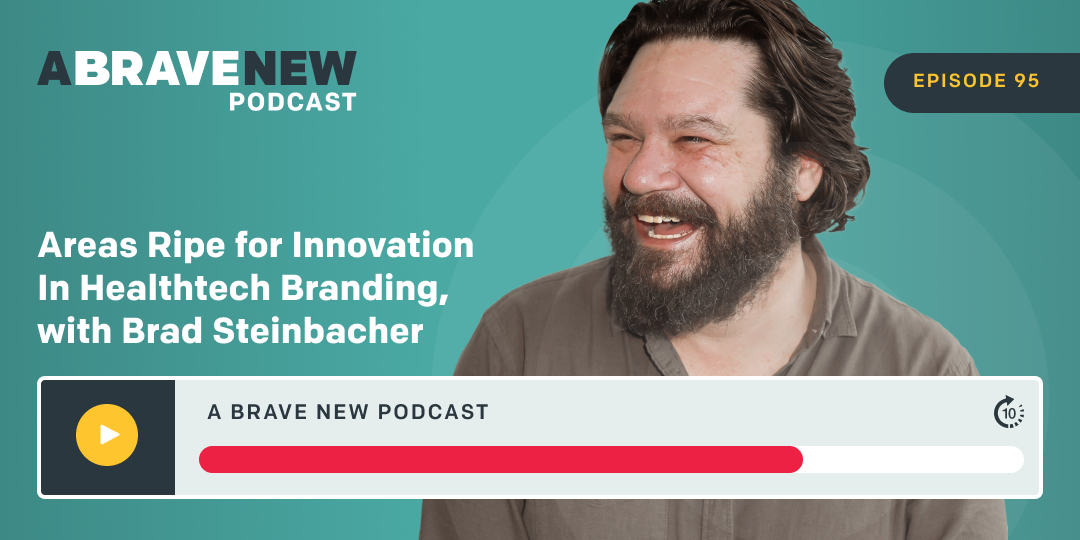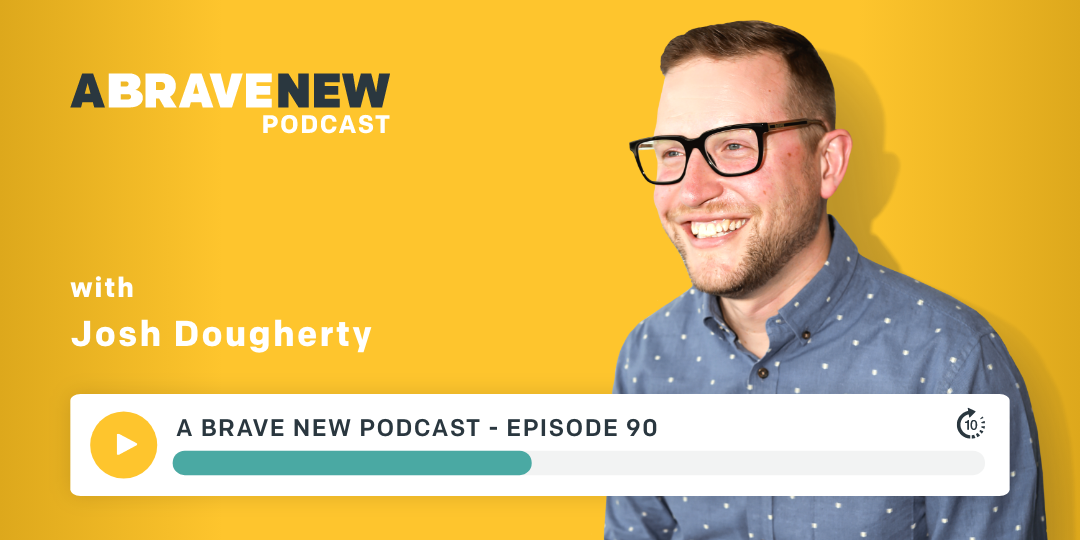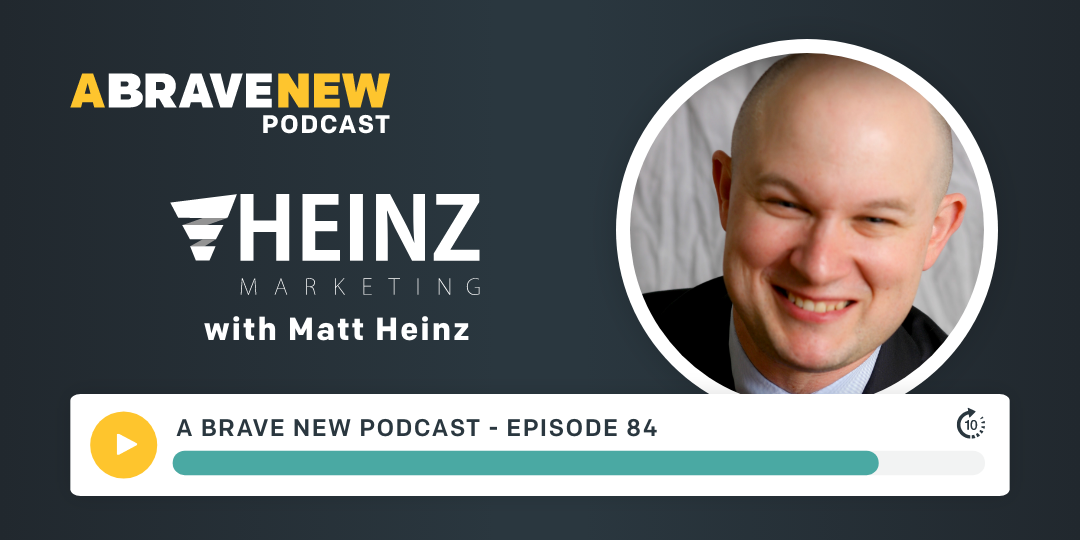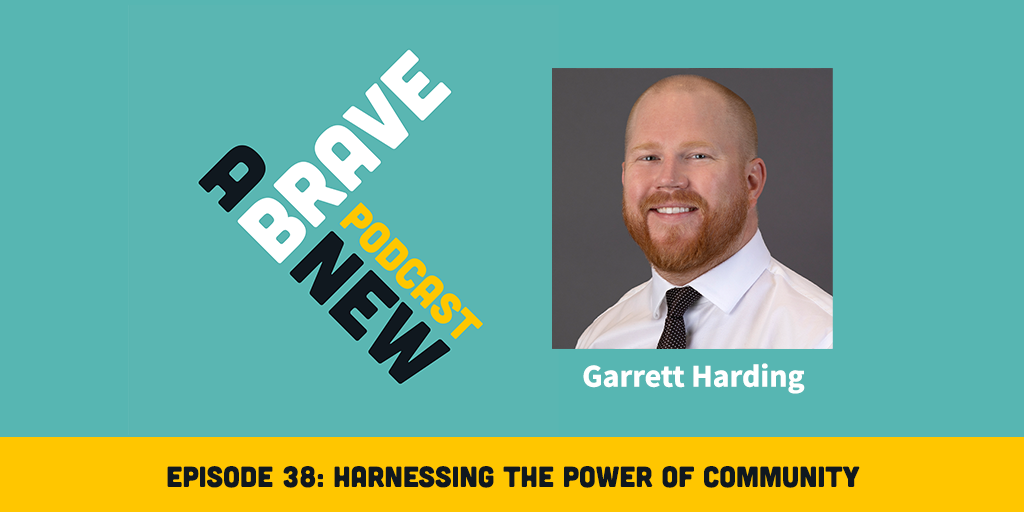Alison Tyrrell is the Head of Marketing at SilverCloud Health. She is a multi-award-winning marketer, with over 17 years of global marketing & communications experience. She has worked in multiple countries, with some of the world's largest brands. Alison has a keen interest in psychology, behavioral economics and anthropology and brings these learnings and insights to her work where possible. She is motivated and passionate about using marketing for positive impact and has spent the last 7 years within ESG and Healthtech.
What you’ll learn about in this episode:
- How marketing in healthtech differs from other industries
- Methods for controlling complexity when marketing to numerous complex audiences
- Alison’s passion for understanding people and how they make decisions, and how that influences her decisions in marketing
- How Alison has harnessed an incredible curiosity and drive to ask questions to continuously learn new things and grow her expertise over the course of her career
- The importance of never giving up in marketing, but rather embracing pivots so that you can move in a different direction
- Why you should hire a goat to join your next Zoom meeting using Goat-2-Meeting
- The influence neuroscience, behavioral science, and anthropology can have on marketing
- How to ensure innovation is possible even if failing fast isn’t an option for your organization
Additional resources:
- Alison Tyrrell on LinkedIn
- Alison Tyrrell on Twitter
- Goat-2-Meeting from Sweet Farm
- A Brave New’s Website
Transcription:
Intro: Welcome to A Brave New Podcast, the podcast, all about how big ideas, brave thinking and marketing smarts, help businesses grow. Here is your host, Josh Dougherty.
Josh: Well, and welcome to A Brave New Podcast. This is your host, Josh Dougherty. I'm so excited to have you here today with me listening. Today, I'm joined by Alison Tyrrell. Alison is really a multi award-winning marketer. She has years of experience, both in global communication and marketing, and worked in multiple countries for multiple of the largest brands in the world. And one of the things I really appreciate about Alison is her keen interest in psychology, behavioral economics, anthropology, and how all those learnings and insights mix into doing great marketing. She's motivated and passionate about using marketing for positive impact. And she's spent the last seven years working within ESG and Health Tech. She's currently the head of marketing for SilverCloud Health. And Allison, I'm really excited to have you. Thanks for joining me today.
Alison: Thanks so much for inviting me.
Josh: I'd love to dive in a little bit, just to hear about a little bit of the work that you've been doing with SilverCloud. What are you focused on right now?
Alison: Yeah, at SilverCloud, so our mission, if I start there, our mission is to break down barriers and empower lives. So one of the key barriers we look at addressing is access. So making access to detrimental health support easier for people in every country or in any sort of situation. So from a marketing perspective, we support this mission through PR Demand Generation with sales and partnerships, product marketing with product, production, digital marketing, and lastly, customer marketing with customer success. So we move fast as does the industry. And at any given moment, we have a multitude of projects and innovations, but I'd say our focus right now is on innovation. So how do we evolve the products that we currently have to support our customers' changing needs because so much has changed since the pandemic. So, yeah. That would be our focus right now.
Josh: Nice. Tell me a little bit about working in mental health. I think this has become an area of huge need globally. So how has that accelerated or changed how the work that you're doing?
Alison: Yeah. So do you mean in my career how has it changed?
Josh: Yeah, well, I was thinking more about working with SilverCloud. How has that accelerated, I think the need for your product and how you guys have had to evolve as a team?
Alison: So there's always been a massive need for mental health solutions. So pre pandemic, there was a massive opportunity and need for solutions such as SilverCloud. I think the pandemic kind of puts pressure on the need, if that makes sense. A lot of clinician resource was allocated to supporting the pandemic rightly so, but then we were in a new position globally where people's anxieties and the uncertainty of where we were, were rising. And when they wanted support, there was a lack of workforce to meet that need. So then you have a compounded effect on need versus supply to address that need. So I think that's where digital mental health... I think it was an opportunity for us in that where there might have been a hesitancy before to apply a digital solution to a mental health space. We were forced into a digital space very quickly when we were all suddenly going home, building our home offices, our kids were doing school on Zoom, formats, everything kind of became more digital.
Alison: A lot of people were moving their therapy sessions to a Zoom session, that the acceptance of it was a little bit wider than as well. So on one hand, the need is compounded. And on the other side, the acceptance to try it was growing. So from a team perspective, even though we are all human, obviously, SilverCloud, and we were all dealing with our own battles with lockdown, et cetera. And I think the passion and purpose behind actually helping people during this time really accelerated us. And we created a hell of a lot of new products. We even made COVID programs, which we made free, I think the entire lockdown period for everybody in the UK. And we made them accessible as well to clinicians to support them during that time. Yeah. We really just got our heads together and tried to make a difference.
Josh: Yeah. I love that about almost every organization that was able to step into the gap during the pandemic, you see this great, flourishing innovation that just leaps everything forward. And you've always, obviously not ever shied away from challenges because as you look back through your career, you've worked in numerous different industries, different organizations, and it's been a pretty very career, which I think is something that's super interesting, because you bring a lot of perspective that way. But I'd love to hear as you dove into healthcare and right around the time of the pandemic, how do you think that space is different from the industries you've worked in before?
Alison: Yeah. This one is interesting because yes, I have worked in a lot of different industries and fundamentally, the foundation of what we do in marketing is the same, right? It's just that the messaging or maybe the formats and certainly the target is changing, but the fundamentals are the same. And I had a notion before this, that all the skills were transferable. And I know a lot of people who think that way in the industry too, until I joined healthcare in Health Tech and don't get me wrong. I still think that there are transferable skills, but the targeting challenges become much harder. And the needs of our customers become more bespoke, more complicated across different industries. If you just think of health systems alone, health systems in different countries are entirely different. And so understanding them is immensely complex. So that alone is a challenge.
Alison: And then of course, the messaging needs to be far more considered when dealing with mental health, from a sensitivity point of view and an ethical point of view. So in addition, marketing is leveraged far more from communications expertise within the product and platform and post implementation. We do digital platforms of content for our customers to kind of pull down when they need to, we put on exclusive events for them, et cetera. Whereas, in other industries, we traditionally just sat at the top of the funnel, post product creation and then figure out how to let people know it existed. So we were a lot more involved in Health Tech, but it is incredibly interesting. It's extremely challenging, but enormously rewarding.
Josh: Yeah. I think that's so true. I talked to many different clients, different guests we've had on the podcast who have that same challenge of talking to these hyper complex audiences that have very specific needs and justifiably so. I think as marketers, sometimes we try to dumb down how we're communicating with people, but sometimes it's like, nope, with a health system, you can't really do that. They're working in a complex area. They're dealing with government regulation, all these things. So we're not getting too far into details, but I'd love to hear some techniques and I'm going a little off script. So you can take a second to think about it. My editor will clean it out, but I'm interested to hear a little bit about how you control the complexity when you're dealing with so many audiences that are so different.
Alison: Yeah. And that is an ongoing challenge for us. I think from a business perspective, we try to identify the opportunities with the biggest impact. And then from a marketing perspective, we have created a tier system. So what gets tier one treatment versus tier two versus tier three, so that not all resources and all budget and all effort is going equally into things that might not change the world. So I guess that's the first thing that we try to do. And then from a, like you said, all of the audiences being entirely different and needing different things, we're trying to more and more offer them solutions to help themselves.
Alison: So what platform can we adopt that has no barrier to a health system accessing it versus a corporate accessing it that allows them to put their own logo in, to make the changes that they need to that suit their patient versus their client versus their employee or student and empower them to make those changes that fit them as opposed to us kind of spending a lot of time making one thing for one organization. We definitely haven't mastered it yet. So we're just trying to, as we go along, identify more and more opportunities where we can be a bit more laser focused and a little bit more how can we empower as opposed to doing everything.
Josh: Yeah. That makes a lot of sense. I want to zoom in a little bit about your career because one of the things I've really appreciated about that is, in your journey is kind of this hustle you spent time consulting, freelance at agencies working in-house. And I think a lot of times people spend all their time on one side of the fence or the other between agencies or in-house. And I'm interested to hear from you how you think that experiencing your ability to work on marketing from so many different directions, has given you a unique experience or perspective in your work.
Alison: Yeah. I mean, I think I've always taken an entrepreneurial approach to the work that I do. So I naturally like to push further and hire it. It's just in my nature. And I think that the way that I've applied my career is, even though I'm working for a company or for a client, it's my name on what I'm producing to them. So it kind of feels like I'm my own little business person.
Josh: Of course.
Alison: So that's one element of it, that has kind of pushed me into so many different areas with a relevant amount of confidence because I'm looking to explore and grow. But then I guess another thing is also, the hustle's coming from a genuine passion and interest. I don't think it's a passion for marketing per se, but actually a passion for understanding people and the choices they make and the cultural influences and the psychology of their decisions. And then I guess that's what makes me dig a little deeper into the insights before creating something. So to ensure that we're covering out a new space as opposed to just copy and paste.
Alison: Yeah. And I think that the fact that I've changed so many different perspectives in the industry, they're going from brand, FMCG or utilities, et cetera, then going to agency and having to learn the backend of all of the things that you were hearing as a client and just blindly trusting your agency. I now understood what they were saying to me and then kind of came back around again to brand, but in an entirely new industry, I'm just taking little learnings along the way and then applying them to what I'm doing.
Josh: Yeah. I think the focus on understanding and how people work is what most great marketers have, right? Because at the end of the day, executing a marketing program is hugely challenging, but the tactics can be learned, right? It's more about understanding how people work and how they process and think through things. So you've obviously focused a lot on continual learning as well. And I'm assuming that this is part of the reason you focused on that because there is the human mind and understanding how that works is infinite or infinite, but I won't kind of put those words in your mouth. Why has that continual learning focus been so important for you? Is it really tied up in that psychology side of things?
Alison: Yeah. I've always had a natural inclination towards that. It's always been a genuine interest and I think everything ultimately is just an opinion or perception. And so therefore gathering as many views as you can enables you to make, not only a more informed decision, but it also starts to exercise your own flexibility, to think about other potential solutions outside of the norm. So it's kind of testing me in regards to how open I can think. And most careers also have a self proclaimed, quote unquote gurus and marketing certainly does, but very early in my career, I kind of noticed that nobody really knew what they were doing. I was going to these talks and hearing the same thing, just be repackaged, rephrased, and sold as the new marketing strategy. And I realized actually, no, we were doing that way back when you've just called it something new.
Alison: And at that time, I felt somewhat deflated, going to these marketing conventions and listening to the same speeches. So instead I started listening to the scrappy CEO who started a startup and listening to a lot more of these startup hacks, these entrepreneurs that were finding their way through, pivoting through the crevices and learning and adapting along the way. And I felt so much more inspired by the way that they were marketing their own businesses and actually breaking through than I did hearing about the same stuff within the marketing industry, which kind of was looking too much in on itself, I felt. So I read more books and did more courses and got into psychology and then kind of read around that. And that's kind of how my knowledge then grew and that's never going to change. I'm never going to learn everything. So therefore, I need to always continually learn.
Josh: Yeah. You've got to keep asking those questions. I think that's what drives me too as a marketer. I've been in the industry for a long time as well, and I don't want to do the same thing over and over again.
Alison: Exactly.
Josh: I want to make some new connections. I'm interested to hear if there's any stories that you remember from one of those scrappy CEOs that especially stands out as an interesting anecdote to share, to kind of give us a little view into that inspiration that you found through here on the [inaudible 00:15:02].
Alison: Oh, there's been loads, there's been loads. I used to love the Master of Scales podcast, where every episode was another story. Yeah. I mean, the best stories that I can remember right now, I can't remember the people who own the businesses, that's probably not helpful, but I think ultimately, it's about how they didn't stop. When they failed, they learned from the mistake and they found a new way through. And I love that. And I think that in marketing, that's what it's about. It's about looking at insights. It's not a finger to the winding. You're not necessarily going to get it right, but you're going to see, okay, this didn't work, this slightly did, let's pivot. And that could be something like a word. It could be a color, it could be an image. It could be applying music. It could be that you've put the right ad in the wrong context. So it's continually learning. And I guess if you're the entrepreneur in that position, you are changing the product. We're kind of doing the same thing.
Josh: Yeah. I was thinking about it, I was at a conference last week and one of... They were highlighting businesses that had succeeded through the pandemic. And one of them was an organic farm outside of San Francisco. They had thrived on these executive retreats and then all of a sudden, everything got canceled right in 2020. So they invented a product called Goat-2-Meeting, where you could bring in a goat to one of your Zoom happy hours and make a million dollars over the course of the year, totally replacing their revenue by having a goat come in for 15 minutes. And for me, those are the things that I like, that have nothing to do with what I do in my day to day marketing. But it's inspirational to think about like, okay, that's what out of the box thinking actually looks like.
Alison: Absolutely. And I now really want to go to my office.
Josh: You can still do it. It's a product now, so.
Alison: That's brilliant.
Josh: Yeah, it was. So one of those areas I know that you've been focusing a lot on is neuroscience. You already talked about this a lot or a little bit, but can you share with me maybe, or with our audience, two or three tidbits that have been really powerful as you've dug deeper into this topic and tried to understand how neuroscience works? What are maybe a couple insights for our audience around how that relates to marketing and how people can put it into practice?
Alison: Yeah, sure. So I guess my interest originally grew about neuroscience about 10 years ago, because I was learning about how it could be applied to commercials to understand how audiences were absorbing information. So first of all, that is kind of how it's applied. You can understand based on how somebody's brain is lighting up, what part of the commercial exactly was impacting their attention? Was it the music? Was it when somebody walked on screen? When did it drop off? Why did it drop off? What changed in that moment? And since then, I started analyzing a lot of the video content that my teams were producing and kind of breaking it down frame by frame to understand... The engagement times stopped around here. And generally, they are quite consistent. So the majority of your average drop off, they're kind of happening around the same time.
Alison: So identifying what changed, who came on screen? How did the topic change around that time? And learning from that was really interesting. Now, with neuroscience, you're going to be using something like an FMRI scan, which is a functional magnetic resonance imaging. Realistically, you're not going to be using that in marketing, right? But that's essentially a technique that exposes the brain to a multitude of magnetic fields and allows you to track the activity of the brain based on blood oxygen levels. So there'll be more oxygenated blood in an area of your brain that's actually being activated and that bit will light up on the screen. And so in neuromarketing, you use it to predict consumer behavior, but to be honest, first of all, I'm not an expert in it. Second of all, I would have an interest in it, but I would take it with a pinch of salt, mainly because one, you can't just use those machines as, and when you want them, there are agencies and third parties that will help you do it.
Alison: But also there's so little that we know about the brain. And there's so many factors at play other than what's happening at that moment, that I'd lean more towards my interests in behavioral science or anthropology to understand how we make decisions, how we influence people's decisions and how the context of their culture can impact how they make decisions. And that to me is a lot more interesting in that, it feels a lot vast. Whereas, I feel all I know about neuroscience right now is quite lasered and we don't know enough about it, but again, like I said, I'm not an expert. I'm just passionately interested in all of those elements.
Josh: Totally. It sparks more interest to us here. So talk about behavioral science, in your knowledge, if you have a deeper knowledge there, what are maybe a few takeaways from that behavioral science understanding and your study of it that you've been able to apply effectively from your marketing?
Alison: Yeah. I mean the basics, which will be familiar to a lot of marketers, but maybe they didn't know the term for it, or sometimes they forget it and their strategies are like, what cognitive bias do you think that your audience is going to have? Social norms, it's vastly used in marketing strategy. But I think that the way in which we influence a social norm can be a little bit more sophisticated and it can be used truly everywhere. So we would even use it now to help people understand or get them to complete an element of a program that they might feel a little bit demotivated to complete right down to nudging architecture. So a story that I love was about going to a petrol station and there's usually a diesel petrol, which is lower and then a very expensive petrol, but to get you to spend the more expensive petrol, they'll add one that's even higher in price.
Alison: And they'll put the one that was the most expensive in the middle because people will be like, well, the cheap one probably wasn't as good and a really expensive one is just a bit too expensive. So I'll go for the middle one, but little do you know that the really expensive one didn't exist before and it only existed to make you choose the middle one, which used to be the more expensive and that's nudging architecture and it's also manipulative, but it is interesting to understand, it also makes you go shopping with a completely different lens on how things are being marketed to you. But yeah, nudging architecture is really, really interesting.
Josh: Yeah. I always think about that when I go to the product pricing page on a SAS Product and it's like, starter, pro, enterprise, contact, essence. It's like, oh, I can afford a pro, and that's all they really want to sell you, right? At the end of the day.
Alison: Absolutely. Yeah. You're spot on. A much better example of what [inaudible 00:22:27].
Josh: Well, I like the petrol station actually, so. I'd love for you to put on your hat and think about the future with me, technology, marketing channels, audience preferences, they're changing really every day, they're transforming. My belief is really, that's going to accelerate over the coming months and years. We know technology is doubling in complexity, I think in weeks and days, but I'd be interested to hear from you, someone who's had an incredibly long or a successful career in the midst of a lot of change, right? And I'd love to hear, what do you think isn't going to change in the coming years? As we look forward to technology accelerating, what's going to stay the same? What can a marketer kind of hang their hat on and say, I'm going to emphasize these things and it's going to make me successful for the long term.
Alison: So this is a very hard one to answer, because I don't think anything stays the same and even if I look at... I was talking earlier about the marketing fundamentals and that they tend to be relatively consistent through the decades. I think even they will need to pivot with time and cultural changes. As I was kind of thinking about this more, I was like, well, maybe the consistency is that the audience is still always going to want something valuable, something that's going to help them. But I think that's going to be increasingly more difficult with how much content is going to be pumped out and how the Metaverse is going to come about creating hell of a lot more distractions for us, or then I was thinking, well, maybe out of home, out of home could be a consistent channel for marketing, but then technically, it won't because it'll be competing with Metaverse and as a channel, it will evolve a lot. So yeah. I don't know if anything will stay as it currently is. Yeah. I don't think it will. What do you think?
Josh: I don't know. I think some of the principles spoken out about how people make decisions will stay the same and how we process things. But I think I tend to land on the same point as you that there's no real tactic or even methodology that will stay the same. I think still, Brand becomes, I think, much more incredibly important in this world where everything is shifting quickly, because if you can come up with a value proposition that's going to be somewhat lasting, even that is going to have to evolve over time, right? But if you can maintain that, that's going to be valuable to you, but I think it's more the psychology of influence in influencing how people make decisions and how you connect with people and their needs is the only thing that really won't change because there's probably going to be a myriad of new tactics you're going to use to connect with someone, build up that trust.
Alison: I wonder though, I wonder if that won't change in that, even with the next generation and how much they've been impacted at a young age, with two to three years in a pandemic. They're a lot more digital now, in the way that they socially interact. We don't know yet what the full effect is on-
Josh: Totally.
Alison: So I would be surprised if they weren't largely different to how we are as adults, once they get to be adults. I think we are of the generation where we still knew what it was like to not have the internet, they don't. Yeah, I'm interested, but I'm also a little bit skeptical. I kind of do think, not skeptical in a bad way, but skeptical that it won't be vastly different. And then I'd agree with you also in regards to how brands turn up.
Alison: What I do see is that brands need to have a little bit more meaning, a lot more meaning than they used to. Even from an investor level, your investors are really, really focused on ESG strategy, which is a good thing. But if you look at how brands have changed in the last five to 10 years, they're all starting to look the same. I don't know if you've noticed that.
Josh: Yes, absolutely.
Alison: Feel free to bleep this, but even when you look at (beep), I don't know what they've done to their brand, but it does not look as good as it used to. Everything seems to be simplified. And it's all looking very the same. It's interesting. And I don't know what drove that.
Josh: Yeah. I think a little bit of that is an overemphasis. Well, I don't really know if my conjecture is right, it is an overemphasis on metrics and data and optimization that drives everyone to do the same thing. And this isn't me saying I don't like data or metrics. All those things are super important, but I talk a lot with my team, even about how you can optimize yourself to death. And then at the end of the day, you look exactly the same as everyone else. And so I think that would be my guess, now I don't have any... After I spend time bashing on data, I will say, I don't have any data to back that up. But I think that may be one of the causes of that.
Alison: I would entirely agree with that. And I think you're definitely onto something. And there are also a lot of articles and studies to suggest that I'm like you, I'm very much for data and insights. Absolutely, a massive proposal of that in any sort of strategy. But I do think that my interest in psychology and anthropology comes from the fact that data alone isn't enough. And so you kind of bring up the point that that might be the reason that we're all starting to look the same. It tracks, it sounds like that could legitimately be the reason, which is quite interesting in itself.
Josh: Yes. I think the other thing that is potential, and I wonder what you think about this is that failure comes so much faster than it did 15 years ago. So if you're taking a chance has a lot more risk today because you may be out of business tomorrow versus, I mean, I would say even five or 10 years ago, you could try something, maybe have a bad impression, but it doesn't become a globally bad impression across the whole internet in 15 minutes. So I think that's another thing that is challenging. I don't know. What do you think about it? Do you agree?
Alison: I completely agree with you on that too. And something that we are very conscious of in the industry that we're in now is, there's a lot of VC interest in Health Tech, right? They see the revenue opportunity, for sure, well, that makes sense. But they apply the Silicon Valley approach to it, which is fail-fast. Again, that works for a lot of different industries, but it doesn't work for mental health. You can't try to create a solution for somebody's mental health and fail-fast at that somebody's mental health. And I think that, that's something that at SilverCloud, I'm quite lucky that I work for a company that has one of the longest histories of owned research.
Alison: We've got nearly two decades of research on digital mental health because we refuse to fail-fast. And that makes me wonder about this fail-fast mentality. Like I said, I'm not opposed to it. I think that it definitely has a place, but where doesn't it belong? And at what expense does that have, not only on the people that are having to work for the companies to fail-fast, because they're under pressure to learn and learn quickly. But for the end consumer, there has to be a line in what industries you're not going to take that approach.
Josh: Yeah. This brings up a really interesting question for me. So I wonder, you said you guys have two decades of that research, you haven't focused on that fail-fast. How do you maintain your edge as you're trying to innovate in the midst of also trying not to let people down, right? Because you're providing a hugely important service to folks.
Alison: Yeah. It's a great question. And we're kind of lucky in that a lot of our customers are our greatest partners in our innovation. So we definitely have the customer at the center. And a lot of the things that we're creating are based on a direct need from them to say, listen, this is what's happening, this is what we need. So we will build tools and then be able to run random control trials with them within their environment. We've got a digital scientist team, which is another reason that we're able to adapt and learn and grow. Whereas, I think a lot of other companies maybe outsource that, we have a massive team of digital scientists and clinical psychologists who are experts in traditional therapies in a digital setting.
Alison: Honestly, the people that I work with are so incredibly intelligent. I often wonder what the hell I'm doing here. But yeah, I think it's two things, it's having the right partners in the industry who are willing to let us use their environments to learn and run those random control tests. But it's also having a dedicated team whose sole job is to create new ways of addressing the need, whether it's in the health system and it's a case of the clinician is time poor or the outcomes need to improve for the patient. That's all their focus is all day. How can they improve that?
Josh: Yeah. And that allows them to, even though the whole organization maybe is pushing for some level of stability, you have people whose charter is to think beyond the stability.
Alison: Exactly.
Josh: Yeah. That's really good. Well, this has been a great conversation, as we focus on kind of closing up, I have two questions that I ask everyone at the end of every podcast. The first is really around what it means to be brave as a marketer. And the background for this is, I got into marketing because I believe marketing can actually change how organizations do their work and how they think about things. I'm not so interested in the marketing tactics. Don't tell anyone, right? But I'm interested in how I can be a change agent or a catalyst for change, but so I ask everyone and I'll ask you, what do you think it means to be brave as a marketer?
Alison: I already agree with you. So I think a brave marketer to me is somebody who isn't afraid to challenge leadership, to think differently. So for me, good leadership is hiring people who are smarter than you. So to any of your listeners now, or kind of say, don't be afraid to disagree because, as I mentioned earlier, everything is perceived differently by different people. So depending on the person, depending on the context of their environment, of their life. So you might have a great and important perspective that differs and ultimately helps the business or your campaign. And I think it's important, I think a brave marketer is one that challenges the way the business thinks and yeah, entirely agree.
Josh: Yeah. Love it. And then what's your superpower? What would you say is your superpower?
Alison: Yeah, I think my superpower strangely is creative problem solving. I've done a few of those tests in companies where you kind of figure out where you sit and I always get quite high marks for creativity and I'm always thinking, well, I can't paint or I can't... Where does this come from? I don't play a load of instruments. How could I possibly be creative? But where I thrive would be to get me in a room and say, Allie, we can't figure this out. This is happening, this is happening, but we need to get from A to Z and we just can't get there. That's where I thrive. I can figure that out. I'm sure that I've stolen the name from somewhere, but I feel like I've coined it as creative problem solving.
Josh: There you go.
Alison: That's my superpower.
Josh: Great. Well, Alison, thanks so much for coming on. Can you share a little bit about where people can connect with you if they want to digitally?
Alison: Yeah, sure. I'm on LinkedIn, is Alison Tyrrell and you can follow me on Twitter at Ali_JT.
Josh: Awesome. Well, thanks so much for your time.
Alison: It was great chatting with you.
Josh: All right. Have a great day.
Alison: You too.
Outro: Thanks for listening to this episode of A Brave New Podcast. Go to abravenew.com for more resources and advice. If you enjoyed this episode, show us some love by subscribing, rating and reviewing A Brave New Podcast, wherever you listen to your podcasts.
Similar Articles
OCT 11, 2021

The Beginner’s Guide to Generating Inbound Leads
Marketing doesn’t have to be painfully intrusive, like getting yet another telemarketing call right when you sit down to dinner with your family.
OCT 11, 2021

The Beginner’s Guide to Generating Inbound Leads
Marketing doesn’t have to be painfully intrusive, like getting yet another telemarketing call right when you sit down to dinner with your family.

